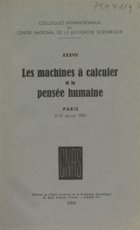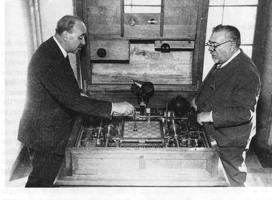Communications of the ACM
The Birthplace of Artificial Intelligence?

In 1951, the most important early European conference on computer science was held in Paris. As the title ("Les machines à calculer et la pensée humaine," or "Calculating machines and human thinking") and the program show, this well-documented event could also be regarded as the first major conference on artificial intelligence. It took place with the support of the Rockefeller foundation.
Two hundred sixty-eight experts from 10 countries, including 10 women (mostly "calculatrices," women calculators), are listed in the 11-page directory of participants. All lectures were translated into French by the Centre National de la Recherche Scientifique (CNRS). The extensive conference proceedings are only available in French, which is probably why this leading conference from the early days of computing history is hardly known in the Anglo-American world.
All the relevant British research centers were involved. However, Alan Turing did not participate, but his colleagues Francis Colebrook, the head of the electronics department of the National Physical Laboratory in London, and F.C. Williams from the University of Manchester did.
Demonstrations
In Paris, several functional devices were demonstrated:
- A chess automaton and analog calculator by Leonardo Torres y Quevedo,
- The artificial animals (some of the first autonomous robots) of W. Grey Walter, and
- A Homeostat by William Ross Ashby.

Fig. 1: Front page of the conference proceedings
on computing machines and human thinking
(source: ETH Zurich library)
Famous participants
Leading participants at the Paris Conference included:
- Howard Hathaway Aiken (Harvard University, Cambridge, MA),
- William Ross Ashby (Barnwood House Hospital, Gloucester),
- Andrew Donald Booth (Birkbeck College, University of London),
- Bertram Vivian Bowden (Ferranti Ltd., Manchester),
- Francis Morley Colebrook (National Physical Laboratory, Teddington, Middlesex),
- Louis Couffignal (Institut Blaise Pascal, Paris),
- Stig Ekelöf (Chalmers University of Technology, Gothenburg),
- Douglas Rayner Hartree (Cavendish Laboratory, University of Cambridge),
- Tom Kilburn (University of Manchester),
- Warren Sturgis McCulloch (Medical School, University of Illinois, Chicago),
- Mauro Picone (University of Rome),
- Eduard Stiefel (ETH Zurich),
- Gonzales Torres y Quevedo (Madrid),
- Albert M. Uttley (Telecommunications Research Establishment, Great Malvern),
- Adriaan van Wijngaarden (Mathematisch Centrum, Amsterdam),
- W. Grey Walter (Burden Neurological Institute, Bristol),
- Alwin Walther (Institute of Practical Mathematics, Darmstadt University of Technology),
- Norbert Wiener (Massachusetts Institute of Technology, Cambridge, MA),
- Maurice Vincent Wilkes (Mathematical Laboratory, University of Cambridge),
- Frederic Calland Williams (University of Manchester), and
- John Ronald Womersley (British Tabulating Machine Co, Letchworth).
The relationship between computing machines and human thought was the subject of many papers.
Chess automaton
On January 12 or 13, 1951, the North American cyberneticist Norbert Wiener played against the chess machine of Leonardo Torres y Quevedo, which was looked after by his son. Eduard Stiefel from ETH Zurich presented his first experiences with the Zuse Z4 digital computer.

Figure 2: Norbert Wiener (right) playing the chess automaton
operated by Gonzales Torres-Quevedo (left)
(designed by his father Leonardo Torres Quevedo)
in Paris in 1951.
(source unknown)
References
Ashby, William Ross: L'homéostat, in: Joseph Pérès (ed.): Les machines à calculer et la pensée humaine, Paris, 8–13 janvier 1951, Colloques internationaux du Centre national de la recherche scientifique, No. 37, Editions du Centre national de la recherche scientifique (CNRS), Paris 1953, pages 475–492
Bruderer, Herbert: Computing history beyond the U.K. and U.S.: Selected landmarks from Continental Europe, Communications of the ACM, volume 60, 2017, issue 2, pages 76–84, http://cacm.acm.org/magazines/2017/2/212431-computing-history-beyond-the-u-k-and-u-s/abstract
Bruderer, Herbert: Meilensteine der Rechentechnik. Zur Geschichte der Mathematik und der Informatik, Walter de Gruyter GmbH, Berlin/Boston 2015, xxxii, 828 pages, http://www.degruyter.com/view/product/432414
Bruderer, Herbert: The birth of artificial intelligence. First conference on artificial intelligence in Paris in 1951?, in: Arthur Tatnall; Christopher Leslie (ed.): International communities of invention and innovation, IFIP WG 9.7 International conference on the history of computing, HC 2016, Brooklyn, New York, May 25–29 2016, revised selected papers, Springer International Publishing AG Switzerland, Cham 2016, pages 181–185
Pérès, Joseph (ed.): Les machines à calculer et la pensée humaine, Paris, 8–13 janvier 1951, Colloques internationaux du Centre national de la recherche scientifique, No. 37, Editions du Centre national de la recherche scientifique (CNRS), Paris 1953, xix, 570 pages
Torres-Quevedo, Gonzales: Présentation des appareils de Leonardo Torres-Quevedo, in: Joseph Pérès (ed.): Les machines à calculer et la pensée humaine, Paris, 8–13 janvier 1951, Colloques internationaux du Centre national de la recherche scientifique, No. 37, Editions du Centre national de la recherche scientifique (CNRS), Paris 1953, pages 383–406
Walter, W. Grey: Réalisation mécanique de modèles de structure cérébrale, in: Joseph Pérès (ed.): Les machines à calculer et la pensée humaine, Paris, 8–13 janvier 1951, Colloques internationaux du Centre national de la recherche scientifique, No. 37, Editions du Centre national de la recherche scientifique (CNRS), Paris 1953, pages 407–420
Wiener, Norbert: I am a mathematician. The later life of a prodigy, MIT Press, Cambridge, Massachusetts, London 1973, pages 333/334
Wiener, Norbert: Les machines à calculer et la forme (Gestalt), in: Joseph Pérès (ed.): Les machines à calculer et la pensée humaine, Paris, 8–13 janvier 1951, Colloques internationaux du Centre national de la recherche scientifique, No. 37, Editions du Centre national de la recherche scientifique (CNRS), Paris 1953, pages 461–463
Herbert Bruderer is a retired lecturer in didactics of computer science at ETH Zürich. More recently he has been an historian of technology, and was co-organizer of the International Turing Conference at ETH Zürich in 2012.
No entries found